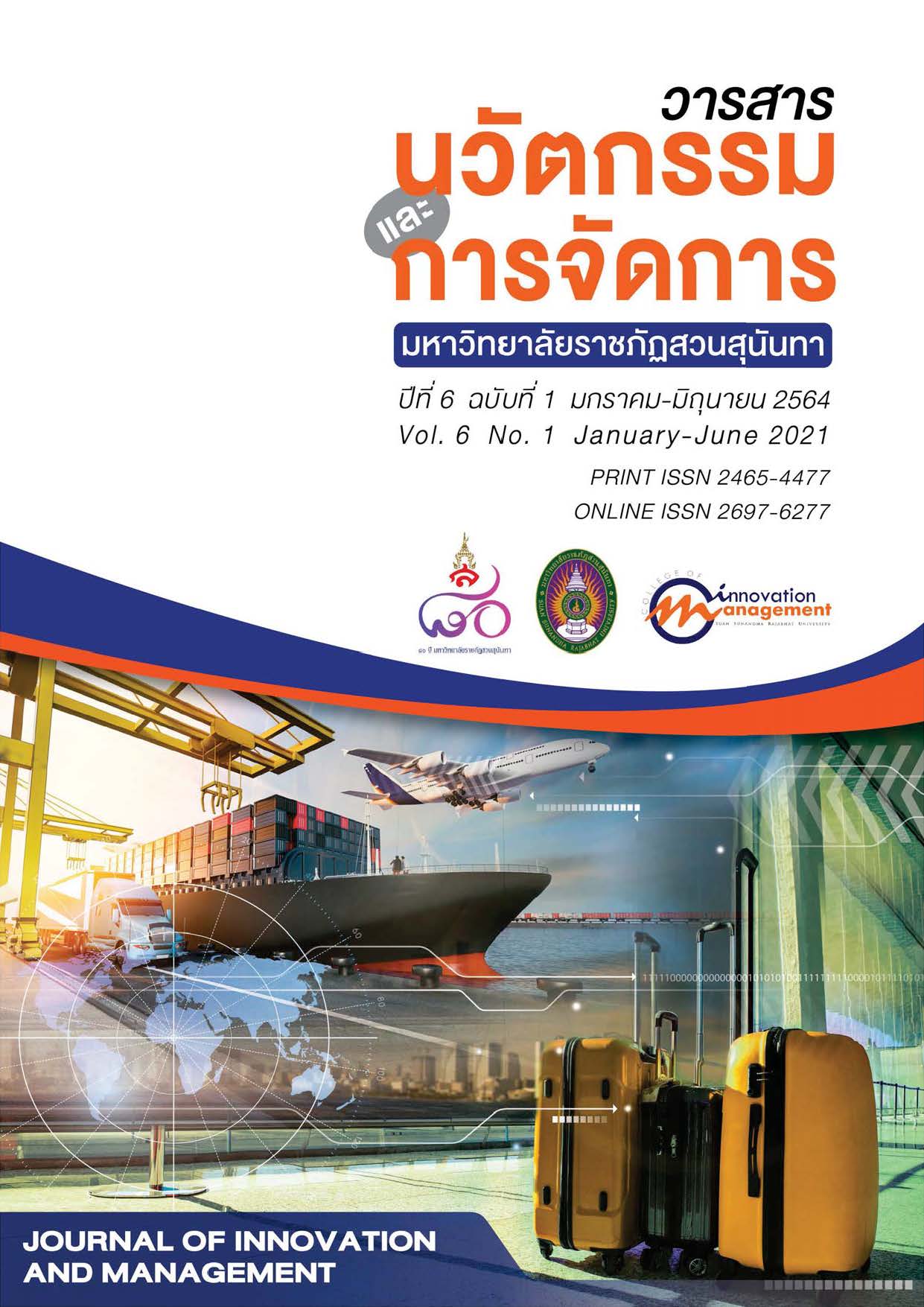Factors Influencing the Acceptance of the Innovative Prototype for the Health Tourism Management
Keywords:
Technology acceptance, Innovative prototype, Management, Health tourismAbstract
The two objectives of this research were to (1) study the differences in degrees of acceptance of the innovative prototype for the health tourism management, which were sorted by demographic characteristics and (2) examine the acceptance of technology that influences the acceptance of the innovative prototype for the health tourism management. The research was conducted in a quantitative design. Selected by the systematic sampling, the participants encompassed 400 health tourists who have been to Thong Lor area, Bangkok. Questionnaires were employed. The collected data were analyzed by means of (1) descriptive statistics: frequency, percentage, average, and standard deviation and (2) inferential statistics: ANOVA and multiple regression analysis. The research findings revealed that (1) considering the participants’ demographic characteristics (gender, age, education, and current profession), it has reported that the participating health tourists with differences in such characteristics show no different degrees in accepting the innovative prototype for the health tourism management, which is at a level of .05, and (2) the factors influencing the acceptance of the innovative prototype for the health tourism management could reveal 65% of prediction accuracy. With the independent and dependent variable test, it has been found that the attitude towards use, behavioral intention, perceived ease of use and perceived usefulness could influence the participating tourists to accept the innovative prototype for the health tourism management, significantly at a statistical level of .05.
References
Aggelidis, V. P., Chatzoglou, P. D., and, Fragidis, L. L. (2016). Integrated nationwide electronic health records system: Semi-distributed architecture approach. Technology and Health Care, 24(6), 827-842.
Baptista, G., and Oliveira, T. (2015). Understanding mobile banking: The unified theory of acceptance and use of technology combined with cultural moderators. Computers in Human Behavior, 50, 418-430.
Cochran, W.G. (1977). Sampling Techniques. 3d ed. New York: John Wiley and Sons.
Davis, F. (1989). Perceived usefulness: Perceived ease of use, and end user acceptance of information technology. MIS Quarterly, 13(3), 318-339.
Davis, F. Bagozzi, R. and Warshaw, P. (1989). User Acceptance of Computer Technology: A Comparison of Two Theoretical Models. Management Science, 35(8), 982-1003.
Grant, B., Dollery, B., and Kortt, M. (2016). Recasting leadership reform in Australian local government: A typology from political theory. Local Government Studies, 42(6), 1024-1046.
Hart, A.O., Nwibere, B.M., and Inyang, B.J. (2015). The uptake of electronic commerce by SMEs: A meta the oretical framework expanding the determining constructs of TAM and TOE frameworks. Journal of Global Business Technology, 6(1), 1-27.
Järvinen, J., Ohtonen, R., and Karjaluoto, H. (2016). Consumer acceptance and use of Instagram. In 2016 49th Hawaii International Conference on System Sciences (HICSS), IEEE, pp. 2227-2236.
Lien, A. S. Y., and Jiang, Y. D. (2017). Integration of diffusion of innovation theory into Diabetes care. Journal of diabetes investigation, 8(3), 259.
Liu Xi, M.A. (2017). Factors Used by Chinese Tourists Traveling to Thailand to Select a Mobile Application for Online Accommodation Booking. Independent Study of the Degree of Master of Arts in Hospitality and Tourism Industry Management. Bangkok: Bangkok University. (in Thai)
Panyawai, P. and Supawan, R. (2016). The technology acceptance and country of origin related factors affecting the attitudes towards cosmetic online pre-orders of consumers in Bangkok. Journal of Innovation and Management Suan Sunandha Rajabhat University, 1, 31-39. (in Thai)
Rhodes, R. A. W. (2018). Control and power in central-local government relations. London, UK: Routledge.
Tankui, N., Nookate, P., Kwanthongyim, W., and Petrak, W. (2017). Application technology acceptance affecting tourists’behavior in phattalung province. The proceedings of the 2nd National Conference on Humanities and Social Sciences: Humanities and Social Sciences for Social innovation, 5-6 August 2019, 1171-1183. Retrieved from http://human.skru.ac.th/husoconference/conf/P46.pdf (in Thai)
Tourism Authority of Thailand. (2008). A project to survey the level of health tourism awareness of Thailand. Bangkok: Planning Policy Department, Tourism Planning Division. (in Thai)
Tourism Authority of Thailand. (2009). Health tourism. Retrieved 1 June 2020 from; http://thai.tourismthailand.org
Thiasana, S. (2014). The development format of a classroom operational research: teaching institutions under Division of primary education in Maha Sarakham district 2. Khon Kean: Khon Kean University.
The World Tourism Organization. (2016). UNWTO Annual Report 2015. UNWTO, Madrid, DOI: https://doi.org/10.18111/9789284418039
Vanichbancha, K. (2018). Statistics for research. 12th ed. Bangkok: Sam Lada.
Wan, L., and Ding, F. (2019). Decomposition-and gradient-based iterative identification algorithms for multivariable systems using the multi-innovation theory. Circuits, Systems, and Signal Processing, 38(7), 2971-2991.
Downloads
Published
How to Cite
Issue
Section
License
Copyright (c) 2021 Journal of Innovation and Management

This work is licensed under a Creative Commons Attribution-NonCommercial-NoDerivatives 4.0 International License.
See Publication Ethics https://so03.tci-thaijo.org/index.php/journalcim/Ethics






